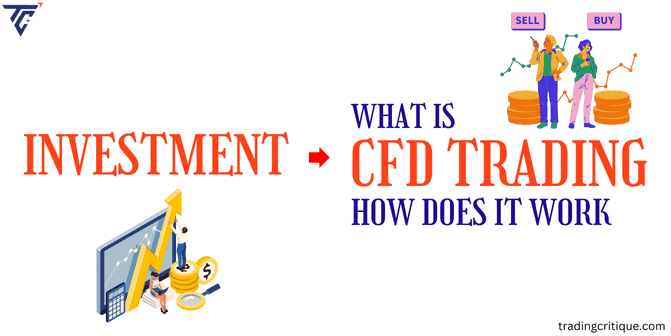Contract For Difference – CFD is a speculative contract that enables investors to profit from price differences of financial assets. These assets include shares, indices, commodities, cryptocurrencies, forex, etc.
Quick Insights
What is CFD trading?
A Contract For Difference – CFD is a contract between an investor and a CFD broker to exchange the difference in the prices of the underlying financial assets.
According to this strategy, the buyer must pay the seller the price difference of the agreed quantity of the asset at the end of the contract time. The value of the underlying asset doesn’t matter in this method of trading. However, the trader receives the benefits of the price change of the asset.
Types of CFD trading
CFDs can be traded in either the spot market or CFDs futures market depending on the market you are taking positions. Spot trading is the best for short-term positions as the spot price is usually the underlying asset price. CFDs futures trading suits medium and long-term positions as it involves speculation on the price of the underlying asset on a future date.
How does CFD trading work?
CFDs generally work in the back of speculation of price change of the underlying financial asset on either side, upside or downside. Simply put, traders predict whether an asset’s price falls or rises based on which, he makes profits or losses in the CFD.
The cost of the CFDs positions is most of the time covered in the spread itself. Which means, your broker adjusts the buy and sell prices to calculate the cost of the trade. When you hold your CFDs positions overnight, it means that you are trading on leverage. Hence your broker will charge you for overnight funding.
Investors prefer CFDs largely for the lower fee structure, which makes the trade more profitable than traditional trading. Some CFD brokers charge commissions on trading stocks.
Pros of CFD trading
Price advantage
CFDs offer the advantage of access to the underlying asset at a lower best price than that of buying outright. Executing a CFD is much easier than that of the regular trading methods.
Low Margin
CFD trading allows investors to invest in assets and earn profits without putting in a large amount of money.
Speculation
The major advantage of CFD trading is, it enables you to speculate on the price movements without owning the physical assets.
Market opportunities
CFDs offer potential profits not only in the rising markets but also in the falling markets because you have the option to bet on the price movement of the assets on either side.
Leveraged assets
CFDs are leveraged products and you risk only a portion of the value of your position required in CFD trade.
Range of markets
CFDs offer access to different assets as well as various trading platforms such as forex, commodities, stocks etc.
Ease and flexibility
It is easy to initiate either long or short positions in CFDs no matter which direction the market moves. CFDs offer access to a range of global markets such as forex, commodities, shares, etc.
Hedging
CFDs trading is one of the renowned ways of offsetting your losses against your profits. Hence, investors generally use them for diversifying purposes. For example, if you think the assets in your existing portfolio may lose their value in the short term, you can use a CFD hedging strategy by going short on the assets and offset your losses.
Tax advantage
Profits earned from CFD trading do not come under capital gains tax as the assets are not owned by the traders/investors. Yet they are not tax-free as well and they are subject to your tax bracket.
Cons of CFD trading
- Margins may magnify the profits of CFD trading but at the same time, we should not forget that they may magnify the losses also. Losses in CFD trades may also exceed your deposits.
- Holding the positions involves a charge of CFD holding cost on the applicable trading rate. One has to maintain adequate margins to enter a CFD trade.
- Lack of liquidity is another major disadvantage of CFD where investors reduce initial positions on shrinking spreads.
Conclusion
When you purchase a CFD, you are literally betting on the price change of the underlying asset and not really buying and selling it. CFD trading is quite a risky strategy, yet profitable when investors use it for hedging against market movements.
Pro Tip
Learn the basics of CFD trading and other trading strategies along with the benefits with our trusted forex brokers. Beware of fraudulent brokers and risks involved in CFD trading.
Frequently asked questions
1. Is CFD Trading good?
Aggressive short-term traders take risky positions in CFDs by using leverage to trade assets that are too expensive to trade.
2. What is leverage in CFD trading?
Leverage in CFD means that you can open a CFD position by paying only a small fraction of the total value of the trade, usually the spread.
3. Are CFDs worth to trade?
Despite the charges, people choose to invest in CFDs to gain access to high-value commodities that they can’t bet on through traditional channels.
4. Is CFD trading banned in the USA?
If you are an American citizen, trading in CFDs in any sort is illegal, and regulated companies will not allow you to open a CFD trading account.
5. Is CFD trading risky?
Yes, CFD trading is quite risky as almost more than 80% of the traders have the chance of losing their money. Since it is a leveraged product, price movement in the opposite direction may magnify the losses in the blink of an eye.








Keep functioning ,great job!
I love it when people come together and share opinions, great blog, keep it up.